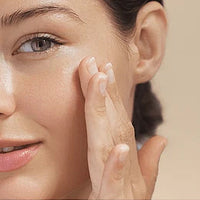We recently interviewed Jess Parkinson for our latest W-Edit. Jess is a certified coach in Breathwork, Well-being, Mental Health First Aid, Yoga, Biomechanics, Personal Training, and Exercise Referral. Jess shared important information about breath control, building resilience, and understanding heart rate variability (HRV).
Whether you're looking to reduce stress, boost your physical performance, or cultivate a deeper sense of calm, Jess's insights and techniques will help you on your journey.
So, what is HRV?
Heart Rate Variability (HRV) is a measurement of the variation in the time intervals between consecutive heartbeats. If you own a modern smartwatch or device, you might find an HRV stat tucked away somewhere, whether you're aware of it or not. Essentially, HRV reflects the fluctuations in your heart rate over time.
The time between heartbeats is used to calculate HRV. A higher variation usually means better health and ability to handle stress. However, it's important to note that interpreting HRV isn't as straightforward as chasing the highest number possible.
While many believe that a higher HRV is better, it's more about finding what's optimal for you personally. Comparing your HRV to someone else's isn't particularly useful, as each person's biology and circumstances are unique.
What's the link between HRV and wellbeing?
Research indicates that a higher HRV is linked to various benefits. These include improved mood, better emotional control, reduced symptoms of depression and anxiety, better sleep, and enhanced cognitive function.
HRV is an important measure of stress levels. It helps us gauge how well a person can manage stress. It can also give us insight into their potential risk for health problems.
“When you track HRV yourself, like I do, you can sometimes predict whether you might be about to get a bit rundown or develop a cold etc. because you begin to see a downward trend in your HRV number over a few days.”
It's totally normal for HRV to dip after facing a bit of stress. Let’s say that my “optimal” HRV is 60. After a hard workout at the gym, I usually see my HRV decrease the next day. This happens as my body begins to recover from the exertion.
However, that number should bounce back up pretty swiftly. Now, if it doesn't rebound in a couple of days, that's when we start digging deeper to figure out what's causing the downward trend.
People with PTSD, trauma, or chronic anxiety/stress may have more frequent and longer-lasting mental health dips than others. This means that their mental health may decline more often and for longer periods of time.
This can be a significant challenge for individuals dealing with these conditions. It is important for them to seek support and resources to help manage their mental health effectively. That's where clinical interventions like therapy come in clutch. Changing how we breathe and our body's functions can make us better at handling stress and triggers.
Breathing and HRV…what’s the link?
HRV is influenced by the vagus nerve, one of our cranial nerves. The vagus nerve plays a crucial role in regulating our rest and digest functions.
In short, the autonomic nervous system has two main branches that impact our well-being. The sympathetic nervous system activates the fight or flight response in times of stress or danger.
Whereas the parasympathetic nervous system encourages relaxation, sleep, and digestion. We need to aim for a good balance between the two to stay healthy. Both need to be balanced and working well for optimal health.
Our bodies can feel threatened in today's fast-paced world. This can happen even when we're not in danger. This is because of stressors at work, plus our busy and technology-driven lifestyles contribute to this feeling.
Our nervous system needs to be active. However, being constantly in this state can lead to problems. These problems include anxiety, stress, sleep issues, and digestive problems.
This is the part where our breathing comes in. Breathing is one of the best and most efficient ways of influencing the vagus nerve and therefore improving our HRV. Why?
Well, because the vagus nerve travels down through both the heart and the lungs they can’t work without each-other! Breathing is a fundamental aspect of our existence, essential for our survival. It is unique in that it can be both involuntary and voluntary.
Our bodies have a system that controls our breathing automatically, so we don't have to think about it. This involuntary process ensures that we continue to breathe even when we are sleeping or engaged in other activities.
However, we also have the ability to consciously control our breathing. This means that we can manipulate our breath at will, slowing it down or speeding it up as needed. Breathing voluntarily is powerful. It helps regulate emotions, reduce stress, and improve overall well-being.
By practising meditation, yoga, and deep breathing, we can use our breath to feel calm and relaxed. By focusing on our breath, we can quiet our minds, centre ourselves, and connect with the present moment. Our breath is not just a biological function, but a tool that we can use to enhance our physical, mental, and emotional health.
When we purposely slow our breathing down to between 5 and a half to 6 breaths a minute (I’ll go over this in the next section), we stimulate the vagus nerve. Stimulating the vagus nerve can help calm the nervous system. This can reduce stress and allow the body to return to its natural balanced state. Next, I will show you how to practise breathing slowly and give you tips on stimulating the vagus nerve.
How can I stimulate the vagus nerve and build resilience to stress?
In the world of breathing and wellness, many people talk about inhaling for 4 seconds and exhaling for 6 seconds. This breathing pattern is often recommended for relaxation and stress relief. It helps to slow down the heart rate and calm the mind. Many find this cadence helpful in promoting a sense of peace and well-being. There are two reasons for this:
- It reduces your breathing rate to that golden 6 (ish) breaths a minute and
- It extends your exhale. Extending your exhales is another star tool in relaxing and reassuring your nervous system
Give this a go with me now wherever you are: Inhale gently through your nose for 4, 3, 2, 1 then exhale for 6, 5, 4, 3, 2, 1… and then repeat. Simples!
Most of the research on improving HRV through breathing is all about cadence and points to what we’ve just discussed above. But there is also growing research on reduced breathing techniques and optimising your overall breathing and fitness.
There are many ways to create that resilience to stress I’m talking about but it’s not just about down-regulation. If we only ever focused on relaxing the body, we’d start to get lethargic and irritable and we’d actually have the opposite effect in the long-term!
The body needs balance and stress is a necessary part of that balance. Think about exercise - we all know that exercise including resistance training and cardiovascular exercise are necessary for our health but these types of exercise are stressful! They add load onto the body and challenge it in order that it can adapt and get stronger/fitter. Even exercise such as yoga still adds a demand to the body but it also creates resilience, increasing range of motion, mobility, strength and also connecting us to and improving our breathing, which we know is important for HRV, health and well-being.”
A final note from Jess…
“Over the years I’ve become really in tune with what my body needs, wants and how to find that place of balance I’ve been banging on about... doesn’t always work out of course, I’m not superwoman. But therefore for me, the tracking of HRV isn’t always necessary. It’s there as a point of interest and I just find it fascinating to see how it’s affected by my hormones, moods, food/drink consumption, sleep quality etc etc.
If you are suffering with chronic stress or anxiety/panic disorder then tracking HRV is likely not going to be for you. My biggest bit of advice is that if it’s going to add extra stress or anxiety to your life then leave it. Do your breathing exercises, do some restorative practices and all the good stuff we’ve mentioned, in the knowledge that it’s making a real difference to your nervous system and well-being.”
If you are dealing with stress, supplementation can also support your symptoms. To discuss your needs and find a routine that works for you, get in touch here.









